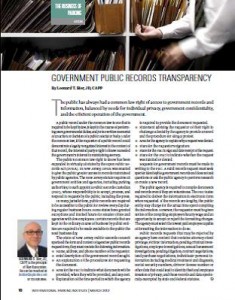The public has always had a common law right of access to government records and information, balanced by needs for individual privacy, government confidentiality, and the efficient operation of the government.
A public record under the common law is one that is required to be kept by law; is kept in the course of performing one’s governmental duties; and/or is a written memorial of an action or decision of a public official or body. Under the common law, if the requestor of a public record could demonstrate a legally recognized interest in the content of that record, the interested party’s right to know exceeded the government’s interest in maintaining secrecy.
The public’s common law right to know has been expanded in virtually all states by the Open Public Records Act (OPRA). In New Jersey, OPRA was enacted to give the public greater access to records maintained by public agencies. The New Jersey statute requires all government entities and agencies, including parking authorities, to each appoint a Public Records Custodian (PRC), whose responsibility is to accept, process, and respond to requests by the public, including the press.
In many jurisdictions, public records are required to be accessible to the public for review every day during regular business hours. Some states have granted exceptions and limited hours for smaller cities and agencies with few employees. Certain records that are kept in the ordinary course of business by public entities are required to be made available to the public the next business day.
The State of New Jersey Public Records Council specified the form and content of agencies’ public records request form; they must contain the following information:
Name, address, and phone number of the requestor.
Brief description of the government record sought.
An explanation of the procedures for requesting the document.
Area for the PRC to indicate what documents will be provided, when they will be provided, and any cost.
Explanation of the time period in which the agency is required to provide the document requested.
Statement advising the requestor of their right to challenge a denial by the agency to provide a record and the procedure for filing a protest.
Area for the agency to explain why a request was denied.
Place for the requestor’s signature.
Place for the PRC to sign and date receipt of the request.
Place for the PRC to indicate whether the request was fulfilled or denied.
Requests for government records must be made in writing to the PRC. A valid records request must seek specific identifiable government records and does not ask questions or ask the public agency to perform research or create a new record.
The public agency is required to compile documents and records even if they are voluminous. The PRC is also required to deliver the information in electronic form when requested. If the records are lengthy, the public entity may charge for the actual time spent compiling the information. However, the requestor must be given notice of the compiling employee’s hourly wage and an opportunity to accept or reject the formatting charges. The agency must select the lowest paid employee capable of formatting the information to do so.
Public records requests that may be rejected by an agency have content that contains attorney-client privilege; victims’ information; pending criminal investigations; employee investigations; sexual harassment investigations; pending litigation; contract negotiations; land purchase negotiations; individuals’ personal information including medical treatment and diagnosis; Social Security numbers; drivers’ license number or other data that could lead to identity theft and employee invasion of privacy; and those records and data specifically exempted by state and federal statutes.
Leonard T. Bier, JD, CAPP, is the principle of Bier Associates. He can be reached at lenbier@optonline.net or 732.828.8864.
TPP-2012-03-Government Public Records Transparency

